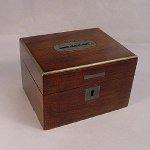

Charles Dickens, All the Year Round [successor to Household Words] 1859
 The
place of business of the Bank in question is an enclosed
railway arch at the east end of London. Its particular address is at
the Christ Church schools, Cannon-street-road, Commercial-road East,
and we are at a noonday hour on Monday, and for an hour on Saturday
nights, exclusively commercial. Onr customers are, on Mondays, little
girls with large street-door keys in their hands; wondering younger
brothers, who with difficulty get their noses to the level of our
desks; hard-working women; on Saturday nights we have for our
customers, hard-working men and youths, who put the scanty surplus they
can save out of their wages, beyond reach of the tempter, who at the
street corner looks so jovial and bright, but whose wraith sits by the
hearth at home so damp and cold, muttering curses, prompting cruel
deeds and desperate resolves.
The
place of business of the Bank in question is an enclosed
railway arch at the east end of London. Its particular address is at
the Christ Church schools, Cannon-street-road, Commercial-road East,
and we are at a noonday hour on Monday, and for an hour on Saturday
nights, exclusively commercial. Onr customers are, on Mondays, little
girls with large street-door keys in their hands; wondering younger
brothers, who with difficulty get their noses to the level of our
desks; hard-working women; on Saturday nights we have for our
customers, hard-working men and youths, who put the scanty surplus they
can save out of their wages, beyond reach of the tempter, who at the
street corner looks so jovial and bright, but whose wraith sits by the
hearth at home so damp and cold, muttering curses, prompting cruel
deeds and desperate resolves. |
Now ready, price 1s.,
Uniform with
PICKWICK, DAVID COPPERFIELD, BLEAK HOUSE, &c,
Tho Third Monthly Part of A TALE OF TWO CITIES. BY CHARLES DICKENS. With Two Illustrations on Steel by HABLOY K. BROWNE. To be completed in Eight Monthly Parts. CHAPMAN and HALL, 195, Piccadilly. W., AND "ALL THE YEAR ROUND" Office, 11, Wellington-street North, London, W.C. The right of Translating Articles from ALL THE YEAR ROUND is reserved by the Authors. |
Back to Christ Church Watney Street